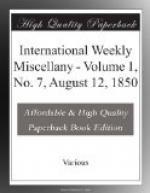The first years of an advocate, even in France, are generally passed in as enforced an idleness as in England. Clients come not to consult the greenhorn of the last term; nor does any avoue among our neighbors, any more than any attorney among ourselves, fancy that an old head is to be found on young shoulders. The years 1830 and 1831 were not marked by any oratorical effort of the author of the Decline of England; nor was it till 1832 that, being then one of the youngest of the bar of Paris, he prepared and signed an opinion against the placing of Paris in a state of siege consequent on the insurrections of June. Two years after he prepared a memoir; or factum, on the affair of the Rue Transonain, and defended Dupoty, accused of complicite morale, a monstrous doctrine invented by the Attorney-General Hebert. From 1834 to 1841 he appeared as counsel in nearly all the cases of emeute or conspiracy where the individuals prosecuted were Republicans, or quasi-Republicans. Meanwhile, he had become the proprietor and redacteur en chef of the Reforme newspaper, a political journal of an ultra-Liberal—indeed of a Republican—complexion, which was then called of extreme opinions, as he had previously been editor of a legal newspaper called Journal du Palais. La Reforme had been originally conducted by Godefroy Cavaignac, the brother of the general, who continued editor till the period of the fatal illness which preceded his death. The defense of Dupoty, tried and sentenced under the ministry of Thiers to five years’ imprisonment, as a regicide, because a letter was found open in the letter-box of the paper of which he was editor, addressed to him by a man said to be implicated in the conspiracy of Quenisset, naturally brought M. Rollin into contact with many of the writers in La Reforme; and these persons, among others Guinard Arago, Etienne Arago, and Flocon, induced him to embark some portion of his fortune in the paper. From one step he was led on to another, and ultimately became one of the chief—indeed, if not the chief proprietor. The speculation was far from successful in a pecuniary sense, but M. Rollin, in furtherance of his opinions, continued for some years to disburse considerable sums in the support of the journal. By this he no doubt increased his popularity and his credit with the Republican party, but it cannot be denied that he very materially injured his private fortune. In the earlier portion of his career, M. Rollin was, it is known, not indisposed to seek a seat in the Chamber, under the auspices of M. Barrot, but subsequently to his connection with the Reforme, he had himself become thoroughly known to the extreme party in the departments, and on the death of Gamier Pages the elder, was elected in 1841 for Le Mans, in La Sarthe.
In addressing the electors, after his return, M. Rollin delivered a speech much more Republican than Monarchical. For this he was sentenced to four months’ imprisonment, but the sentence was appealed against and annulled on a technical ground, and the honorable member was ultimately acquitted by the Cour d’Assizes of Angers.




